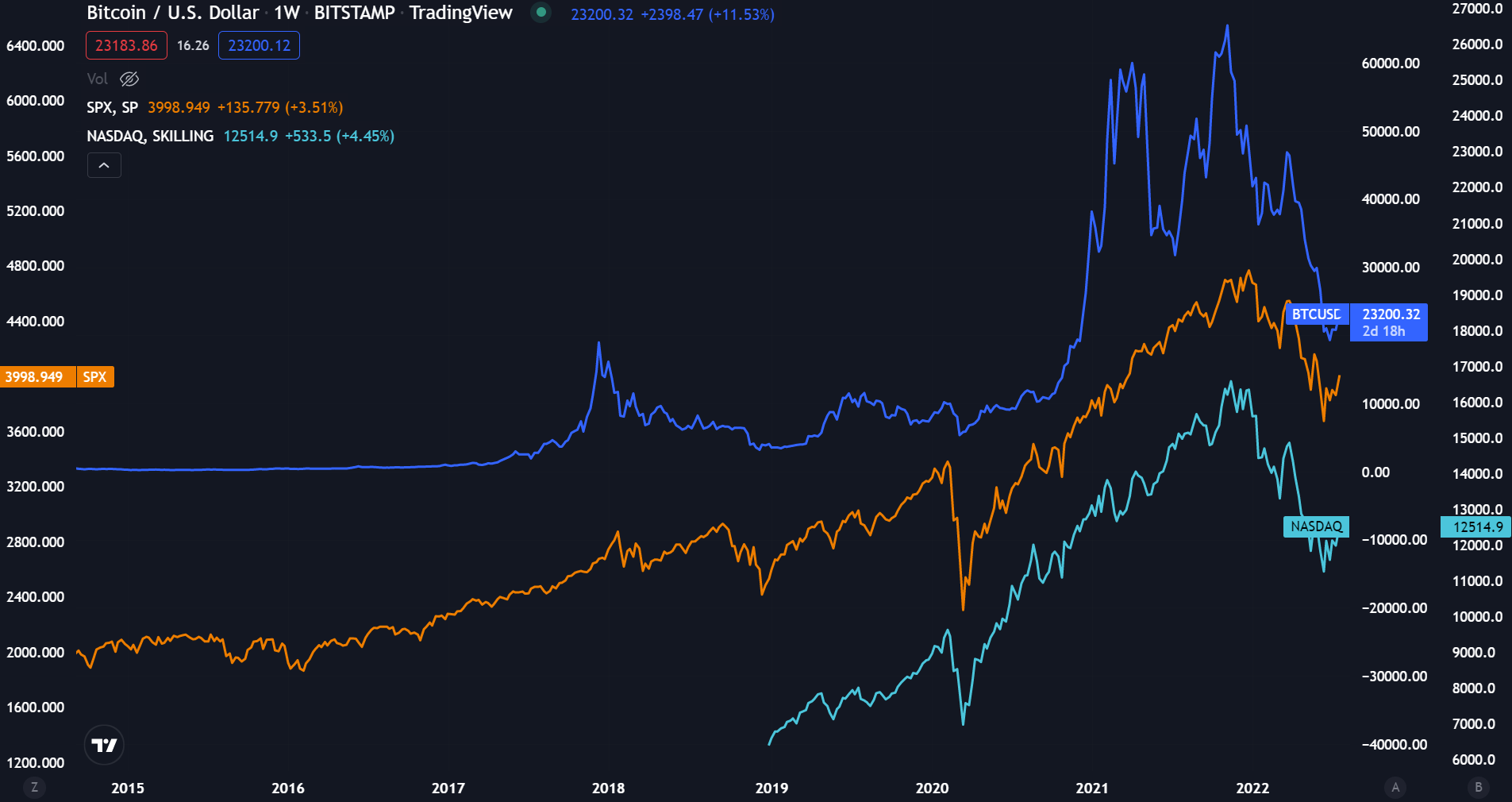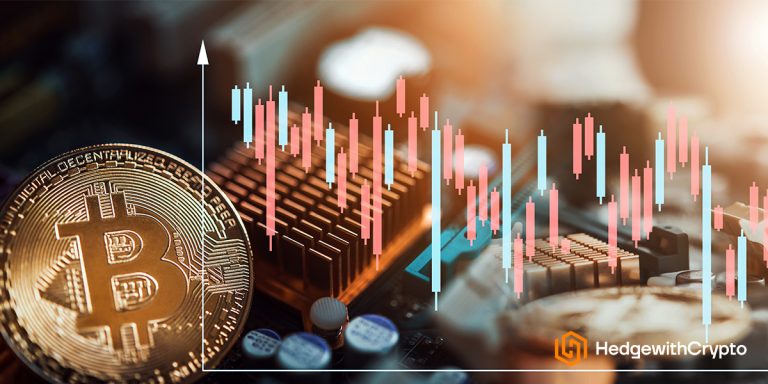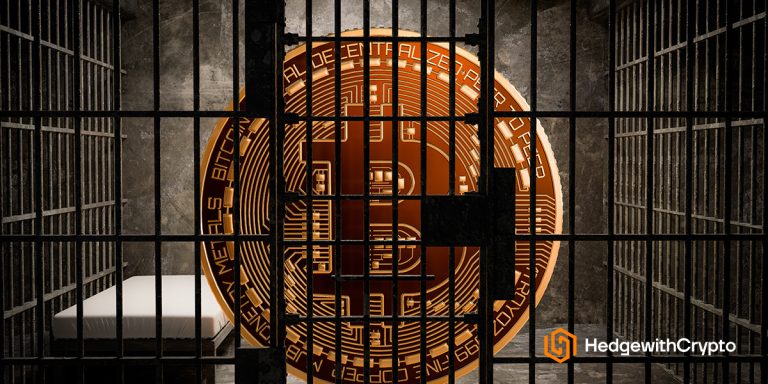Expect This To Happen To Bitcoin’s Price If The Stock Market Crashed
Key Takeaways:
- The price of Bitcoin has crashed independently of stock market performance. If the stock market index remains above 0.2+, then a crash in traditional assets will likely mean a price crash for Bitcoin.
- Due to Bitcoin's volatility, the outflow of investment may be much more severe during a stock market crash than the drain from stocks.
TABLE OF CONTENTS
The link between Bitcoin and stocks has been closely followed by investors. For the majority of its existence, Bitcoin has remained uncorrelated. However, since 2020, changing economic conditions have resulted in a strong positive correlation forming between these two assets. With increasing alignment, it is, therefore, only natural for Bitcoin holders to begin questioning what could happen to the price of BTC if there is a crash in the global stock markets.
Measuring the correlation remains the key to answering this question. Ultimately, it is the correlation between Bitcoin and stocks that will determine the effects that a market crash may have. In this guide, we will evaluate the correlation between Bitcoin and stocks, determine the driving forces behind that correlation, and what it could mean if stocks fell dramatically.
Expect This To Happen To Bitcoin's Price In A Stock Market Crash
Although no one can truly know what will happen in a stock market crash, the correlation between Bitcoin and stocks could be incredibly important when speculating on an outcome. If Bitcoin remains positively correlated, it means that the digital coin is still considered to be a risk-on asset rather than a hedge against traditional assets. When the correlation coefficient between Bitcoin and stock market indexes remains above +0.2, a stock market crash will likely drag Bitcoin down with it – but it is highly unlikely this would mean Bitcoin will crash to zero.
However, markets do not remain correlated forever. Under certain circumstances, Bitcoin could decouple from the traditional financial markets and, once again, return to a correlation coefficient of less than +0.2. A reading below +0.2 would infer that the two asset classes have decoupled, which could mean that Bitcoin is able to avoid the aftermath of a stock market crash.
This Is How Stock Can Crash
A stock market crash is defined as a rapid drop in the price of 10% or more. Fortunately, these events are less common than bull markets, but there have been several examples of market crashes throughout history. Stock market crashes can be the result of a single or combination of factors. A few catalysts that can spark a rapid decline in stock prices include investor sentiment, economic growth, speculation, black swan events and monetary policy – in reality, the majority of crashes are caused by a combination of these.
- Extreme investor emotion/sentiment. Arguably, the most important catalyst of a market crash is human emotion. Stock market prices are a representation of what humans perceive to be fair stock value. If investors become fearful and confidence is low, fair value can begin to fall. This sentiment can quickly snowball, which can lead to a rapid decline in price.
- A decline in economic growth. Stock market values can ebb and flow with economic growth. When the gross domestic product (GDP) is high and unemployment is low, stock markets are more likely to rally. When GDP is low and unemployment is high, stocks are more likely to be poised for a sharp fall.
- Excessive speculation. Sustained periods of stock market growth can lead to excessive speculation of stock values. Speculation can also lead to excessive use of leverage, which can quickly amplify stock market crashes if prices begin to fall.
- Black swan events are any type of event that comes as a complete surprise to the market. Their unpredictability can significantly impact stock market valuations. The most recent example is the COVID-19 pandemic, which caused a rapid decline in all stock indexes in March 2020. Other black swan events can include geopolitical tensions and natural disasters.
- Change in monetary policy. Central Banks globally can implement a range of fiscal and monetary policies to control external market factors such as inflation. Changing monetary policies, such as interest rates, can significantly impact economic growth and have subsequent implications for the stock market.
Stocks And Bitcoin Appear Correlated
The best way to evaluate the relationship between stocks and Bitcoin is to use a correlation coefficient. This is defined by a range that extends from -1 to +1 and can be calculated by comparing the similarity of two datasets. A correlation coefficient of -1 infers that Bitcoin and stocks move in complete opposition to each other. A correlation coefficient of 0 infers that Bitcoin and stocks move completely independently. Finally, a correlation coefficient of +1 infers that Bitcoin and stocks move in perfect unison.
Throughout Bitcoin’s lifetime, many in the cryptocurrency community believed that the correlation coefficient between Bitcoin and stocks would remain close to 0 and, therefore, Bitcoin price would remain decoupled from the traditional financial markets.
The Bitcoin blockchain was developed to operate without reliance on third-party organizations. Therefore, it was hoped that the price of Bitcoin would follow a similar ethos and become completely isolated from the remainder of the economy. In doing so, it could act as an uncorrelated alternative investment. For much of the 2010s, this was true. The price of Bitcoin remained sheltered from many of the factors that affected the stock market. Due to its near-zero correlation with traditional assets, it became widely viewed as a hedge against traditional investments such as stocks, gold, and fiat.
According to data collected from Coin Metrics, from 2013 to 2019 the correlation coefficient between Bitcoin and the S&P 500 index consistently bounced between -0.2 and 0.2. A value between -0.2 and 0.2 represents an insignificant correlation. However, since 2020, a strong positive correlation with stocks has been more common.

At the onset of the COVID-19 pandemic, the correlation coefficient between Bitcoin and the S&P 500 spiked to 0.5, alarmingly high for an uncorrelated asset. It has remained unexpectedly high throughout much of the pandemic. Other analytics companies have also recorded this increasingly positive relationship. For example, in 2022, 21Shares reported a continually increasing correlation between Bitcoin and the S&P 500 stock index between January 2022 and June 2022. The coefficient peaked at +0.70 in June 2022 but has the potential to climb even higher.

Bitcoin And Stocks Became Correlated During The Pandemic
Between 2016 and 2019, Bitcoin enjoyed both a bullish and bearish market. Importantly, during that time the digital coin showed little to no correlation with stocks. Thanks to its capped supply and steady flow rate, the digital asset continued to be viewed as a hedge against many traditional risk-on assets. However, the COVID-19 pandemic resulted in a new age of monetary policy, which changed investors’ views.
The downturn in economic growth caused by the pandemic led to Central Banks around the world loosening monetary policy. Quantitative easing and stimulus cheques resulted in an abundance of retail liquidity, which led to investors acquiring both stocks and cryptocurrencies. This led to an alignment of investment methods. As a result of the liquidity influx, both asset classes recorded new all-time highs in 2021. While the Bitcoin market cap peaked at $1.2 trillion in November 2021, the S&P 500 Index peaked slightly later in December 2021.
The alignment in investment methods led to an alignment in pricing. Rather than act as a hedge against traditional risk-on assets, Bitcoin became embedded within the risk-on asset class. It is now more commonly viewed as an asset to be invested in if there is economic certainty rather than uncertainty.
Unfortunately, with the influx of new money throughout 2020 and 2021, economic certainty could not be sustained. Rising inflation levels resulted in Central Banks, such as the US Federal Reserve, raising interest rates and taking an overall hawkish stance on the economy. With Bitcoin and stocks aligned as risk-on assets, in 2022, the asset classes fell considerably during the first half of 2022; remaining in sync throughout.
Between 2020 and 2021, alongside the transition of Bitcoin to a risk-on asset, the digital coin also garnered the attention of institutions worldwide. Institutional investment and awareness of Bitcoin exploded throughout the same pandemic era. Several companies now hold BTC on balance sheets, and several hedge funds now hold BTC within portfolios. As institutions are intimately intertwined with traditional stock markets, many experts believe that institutional investment has helped to solidify Bitcoin’s stronger correlation to stocks.
What Could Decouple Bitcoin From Stocks?
History has shown that Bitcoin has moved independently more often than stock indexes. Even when the correlation between the two has been above +0.2, there have been times when Bitcoin prices have crashed while stock market prices have remained stable. Likewise, there have been times when stock market prices have fallen while Bitcoin has remained steady. There are two key reasons why Bitcoin could, once again, decouple from stocks and avoid the effects associated with a stock market crash.
- Bitcoin halving. One of the most significant factors that could decouple Bitcoin price from stocks is a shock to supply. Approximately, every 4 years, the number of Bitcoin block rewards is halved. This is better known as the Bitcoin halving. As the number of Bitcoins entering circulation halves, history shows that this can send a supply shockwave through the cryptocurrency market. Supply shocks could cause a movement in Bitcoin price that is not echoed in the stock market. For a supply shock to cause the Bitcoin price to move, demand would need to either stay the same or increase.
- Inflation. Since 2021, global markets have moved into an inflationary environment which is typically combatted with higher interest rates. For many stocks, particularly those in the technology industry, rising interest rates are not good for cash flow and, therefore, market value. In comparison, Bitcoin has a maximum capped supply and decreasing inflationary rate. In an inflationary environment, Bitcoin could outperform tech stocks that are more dependent on low rates of inflation. Therefore, Bitcoin may be a better hedge against inflation than stocks.
Frequently Asked Questions
Will Bitcoin go down if the stock market crashes?
It is impossible to say if the price of Bitcoin will go down when the stock market crashes. In the past, Bitcoin price has crashed independently regardless of what the stock market is doing. Equally, the Bitcoin price has also crashed at the same time that stocks are tumbling. The correlation coefficient between Bitcoin and stock indexes is a key metric for understanding the likelihood that a stock market crash will affect Bitcoin’s price.
Is Bitcoin likely to crash soon?
No one can know if Bitcoin will crash in the near term. The digital asset is extremely volatile. Subtle changes in market sentiment can result in both significant upside and downside. History shows that each time Bitcoin reaches new all-time highs, the market has corrected between 60% and 85%. This provides a possible window for Bitcoin crashes, but it is a window that could easily be broken.
Which crypto will survive long term?
Bitcoin is by far the most likely cryptocurrency to survive long term. It has been around longer than any other cryptocurrency in the industry and holds the largest market value. However, there are also no guarantees. Cryptocurrencies remain one of the most volatile asset classes of all time. Importantly, investors should only dedicate capital to this asset class that they are willing to lose.




